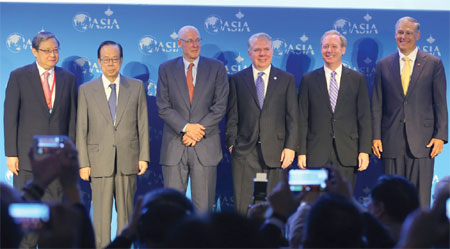Future of green cities subject of Boao Forum
Asia's New Future: Identifying New Growth Drivers was the theme of 2014 Boao Forum. The 2014 Boao Forum for Asia's annual conference (BFA), hosted in Seattle for the first time from Sept 4-6, expanded on the notion of a "new future" and narrowed it down to a more specific point - sustainable development, resource acquisition and the energy framework for future cities.
At one session called Intelligent Cities and Sustainable Urban Living moderated by David Nieh, CEO of Lend-Lease China, on Sept 5, Joel Cherkis, general manager of government sales at Microsoft Corp; Sean Chiao, CEO of Buildings + Places, APAC, AECOM; Jiang Lin, senior vice-president of the Energy Foundation; Qiu Baoxing, former vice-minister of the Ministry of Housing and Urban/Rural Development; and Wang Lu, vice-governor of Hainan province, shared their insights into the implications for the environment, health and urban development as rapid urbanization worldwide approaches.
According to research from the McKinsey Global Institute, China alone will add more than 350 million people to its urban population by 2025.
Qiu Baoxing grouped the frequently mentioned "Smart City" into three types and said he thinks that a smart city is only a tool to reach the target of sustainable cities.
"For China to achieve this target, there are three bottom lines: to develop a compact city; to maintain the diversity of cities in cultural, spatial and industrial perspectives; and to make cities that are livable to citizens," Qiu said.
Sean Chiao said he thought that soft targets, such as making people happy, are harder to achieve.
Jiang Lin agreed that planning cities for people and putting people first is very important.
Joel Cherkis explained how to engage a city's most important resource - its people - by sharing some of the more successful projects they currently have in China.
Last December, the administrative committee of the Xixian New District of Shaanxi province and Microsoft signed a memorandum of understanding (MOU), which set forth the scope of strategic cooperation over the next three years.
Under the MOU, both parties will cooperate in areas such as technology popularization, industry upgrading, IT professional training, startup incubation, and smart city construction. To fulfill the promise, Microsoft will build an innovation center, a software outsourcing talent camp, a tech practice lab and a cloud platform for the local government to handle educational matters.
"You don't need an entire data center," Cherkis said. "We want the people and the knowledge focused around the operation of the city. The people include the people living in the city, working in the city and people that are coming to the city."
Cherkis said true transformation can only be achieved if cities take a people-first approach. Microsoft's model leverages technology not just for technology's sake, but to enable city leaders to do "New with Less", he explained.
One year after MS launched its global city network,it has 200 global partnerships with governments, businesses and citizens. In China so far, Microsoft has 11 large projects.
Cherkis added: "I believe the success in China can be a model for cities in other countries."
"We hope to learn from other countries, avoid the same mistakes during the process of building cities with more sustainability," Qiu said at the end of the panel discussion.
|
Speakers at the opening of Boao Forum for Asia Seattle Conference on Sept 5. From left: Secretary General of Boao Forum for Asia Zhou Wenzhong, former prime minister of Japan and Chairman of Boao Forum for Asia Yasuo Fukuda, former US secretary of treasury Henry Paulson, General Counsel & Executive Vice-President at Microsoft Corporation Brad Smith, Mayor of the City of Seattle Ed Murray, and Governor of the State of Washington Jay Inslee. Linda Deng / China Daily |
(China Daily USA 09/08/2014 page1)

























